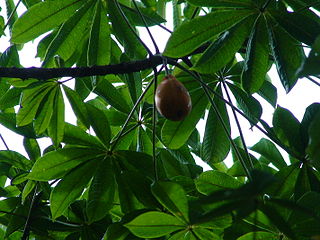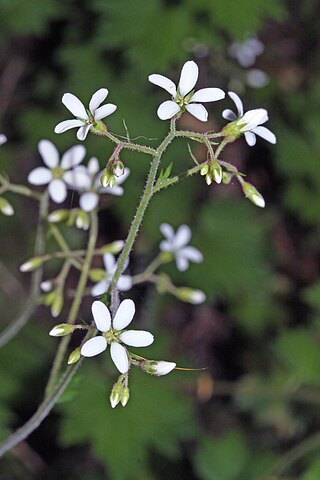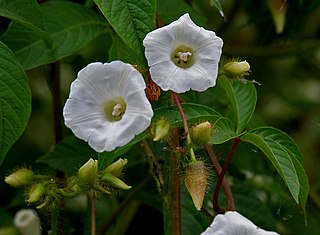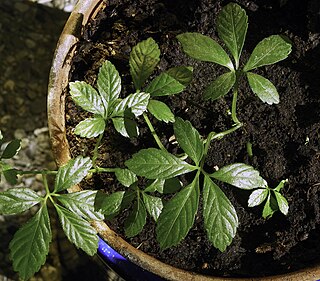
Weigela is a genus of between six and 38 species of deciduous shrubs in the family Caprifoliaceae, growing to 1–5 m (3–15′) tall. All are natives of eastern Asia. The genus is named after the German scientist Christian Ehrenfried Weigel.

Myoxanthus is a genus of orchids with about 50 species, widely distributed in Central and South America. This genus is a close ally of Pleurothallis.

Agathosma is a genus of about 140 species of flowering plants in the family Rutaceae, native to the southern part of Africa. Common names include buchu, boegoe, bucco, bookoo and diosma. Buchu formally denotes two herbal species, prized for their fragrance and medicinal use despite their toxicity. In colloquial use however, the term is applied to a wider set of fragrant shrubs or substitutes.

Brosimum is a genus of plants in the family Moraceae, native to tropical regions of the Americas.

Juniperus procera is a coniferous tree native to mountainous areas in Africa and the Arabian Peninsula. It is a characteristic tree of the Afromontane flora.

Mutisia is a genus of flowering plant in the tribe Mutisieae within the family Asteraceae. Mutisia has been named after José Celestino Mutis. It comprises about sixty species which can be found along the entire length of the Andes and in southern Brazil, Paraguay, Uruguay and northern Argentina.

Balaka seemannii is a species of flowering plant in the family Arecaceae that is endemic to Fiji; growing in mixed forests on Vanua Levu and Taveuni islands.

Helicostylis is a genus of flowering plants in the mulberry family, Moraceae. It includes eight species native to the tropical Americas, ranging from Costa Rica to Bolivia and southeastern Brazil.
Magnolia wolfii is a tree species in the family Magnoliaceae. It is endemic to Colombia. The species is recorded only from one locality in Risaralda Department. The species is being investigated by a conservation and propagation research program implemented by the Technological University of Pereira, with the support of Botanic Gardens Conservation International.

Perebea is a genus of flowering plants in the family Moraceae. It includes ten species native to the tropical Americas, ranging from Nicaragua to Bolivia and central Brazil.

Jacaratia is a genus of shrubs or trees in the family Caricaceae. They are native to South and Central America.

Boykinia is a small genus of plants related to the saxifrages. It contains at least nine species, known as brookfoams. Brookfoams are glandular rhizomatous creeping perennials with highly lobed or toothed leaves and inflorescences of petite flowers. They are native to North America and Asia (Japan).
Henry Beeke was an English historian, theologian, writer on taxation and finance, and botanist. He is credited with helping to introduce the world's first modern income tax.

Ida, synonym Sudamerlycaste, is a genus of flowering plants in the family Orchidaceae. It consists of approximately 45 species and hybrids. The genus was split off from Lycaste in the early 2000s.

Merremia is a genus of flowering plants in the morning glory family, Convolvulaceae. Members of the genus are commonly known as woodroses.

Gynostemma is a genus of perennial climbing vines in the cucumber, gourd, and melon family, comprising at least 19 species, all native to the tropical East or Far East, inclusive of the Himalayas: China ; the islands of Japan; Malaysia; and New Guinea. The term Gynostemma is derived from Ancient Greek γυνή meaning "woman" or "female", and στέμμα meaning "wreath" or "garland". In (post-)classical Latin the form stemma is attested as Greek loanword. In Ancient Greek and Latin, stemma is of neuter gender. German-Dutch botanist Carl Ludwig Blume described Gynostemma from two species he named: G. pedata and G. simplicifolia. Neither species was clearly designated by him as the type; however, the former species, G. pedatum is now considered to be a synonym of G. pentaphyllum(Thunb.) Makino. The genus was published in 1825, in Carl Ludwig von Blume's Bijdragen tot de flora van Nederlandsch Indië.

Maxillaria parviflora, the purple tiger orchid, is a species of epiphytic orchid native to Florida, the West Indies and through Latin America from Mexico to Bolivia.

Moutabea is a genus of flowering plants in the family Polygalaceae with 11 species. It was first described in 1775 by Jean Aublet. Most species are neotropical, ranging from Costa Rica to Bolivia and central Brazil, with one species, M. pacifica, native to New Caledonia.

Ochetophila is a genus of flowering plants in the family Rhamnaceae, native to Chile and Argentina. The species in this genus are actinorhizal plants.

Coussapoa is a genus of flowering plants belonging to the family Urticaceae.


















